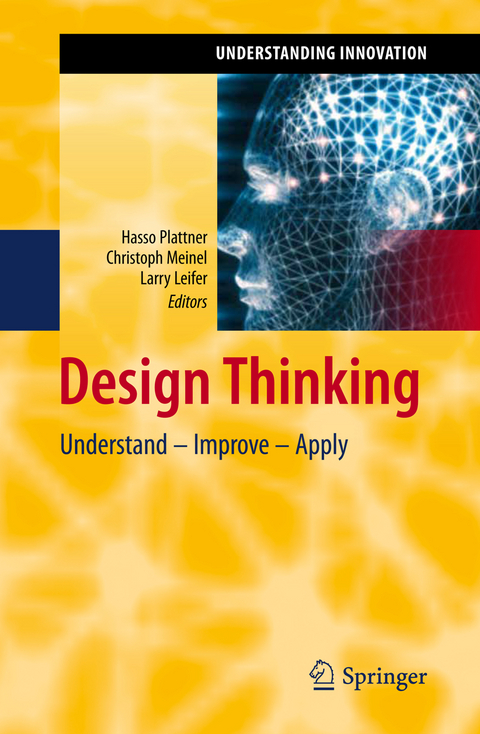
Design Thinking
Springer Berlin (Verlag)
978-3-642-26638-6 (ISBN)
"Everybody loves an innovation, an idea that sells." But how do we arrive at such ideas that sell? And is it possible to learn how to become an innovator? Over the years Design Thinking - a program originally developed in the engineering department of Stanford University and offered by the two D-schools at the Hasso Plattner Institutes in Stanford and in Potsdam - has proved to be really successful in educating innovators. It blends an end-user focus with multidisciplinary collaboration and iterative improvement to produce innovative products, systems, and services. Design Thinking creates a vibrant interactive environment that promotes learning through rapid conceptual prototyping. In 2008, the HPI-Stanford Design Thinking Research Program was initiated, a venture that encourages multidisciplinary teams to investigate various phenomena of innovation in its technical, business, and human aspects. The researchers are guided by two general questions: 1. What are people really thinking and doing when they are engaged in creative design innovation? How can new frameworks, tools, systems, and methods augment, capture, and reuse successful practices? 2. What is the impact on technology, business, and human performance when design thinking is practiced? How do the tools, systems, and methods really work to get the innovation you want when you want it? How do they fail? In this book, the researchers take a system's view that begins with a demand for deep, evidence-based understanding of design thinking phenomena. They continue with an exploration of tools which can help improve the adaptive expertise needed for design thinking. The final part of the book concerns design thinking in information technology and its relevance for business process modeling and agile software development, i.e. real world creation and deployment of products, services, and enterprise systems.
Dr. sc. nat. Christoph Meinel (1954) ist Direktor und Geschäftsführer des Hasso-Plattner-Instituts für Softwaresystemtechnik GmbH (HPI) und ordentlicher Professor (C4) für Internet-Technologien und Systeme. Er hat Mathematik und Informatik an der Humboldt-Universität in Berlin studiert, dort 1981 promoviert und sich 1988 an der Akademie der Wissenschaften in Berlin habilitiert. Er wurde 1992 zum ordentlichen Professor (C4) für Informatik an die Univ. Trier berufen und hat dort in den Jahren 1998-2002 neben seinem Lehrstuhl das von der Fraunhofer-Gesellschaft betreute Institut für Telematik e.V. geleitet. Seit 2004 ist er Direktor und Geschäftsführer des HPIs und hat einen Lehrstuhl (C4) für Internet-Technologien und Systeme an der Universität Potsdam. Neben seiner Lehrtätigkeit in Potsdam ist er Gastprofessor an der Univ. Luxembourg (Luxembourg) und an der TU Peking (China) und als Programmdirektor des HPI-Stanford Forschungsprogramms zum Design Thinking Research tätig. Christoph Meinel ist Autor bzw. Co-Autor und Inhaber internationaler Patente. Seine aktuellen Forschungsinteressen liegen in den Bereichen IT-Sicherheit, Teleteaching, Semantic/Social Web und e-Health. Er war wissenschaftlich aktiv auch auf dem Gebiet der Komplexitätstheorie und hat (BDD-basierte) Datenstrukturen und effiziente Algorithmen untersucht und entworfen. Er ist Chairman des 2007 gegründeten deutschen IPv6-Rats, Herausgeber von ECCC - Electronic Colloquiums on Computational Complexity, des IT-Gipfelblog und des tele-TASK-Archivs. 1996-2007 gehörte er dem Direktorium des IBFI Schloss Dagstuhl an und war Sprecher der GI-Fachgruppe 'Komplexität'. Er hat in einer großen Zahl internationaler Programm-Komitees mitgewirkt, diverse Konferenzen und Symposien veranstaltet und ist in wissenschaftlichen Aufsichtsräten aktiv.
Introductory Chapter: Thinking Research. - Part 1: Design Thinking in Various Contexts. - Design Thinking - A Fruitful Concept for IT Development?. - A Unified Innovation Process Model for Engineering Designers and Managers. - Product Differentiation by Aesthetic and Creative Design - A Psychological and Neural Framework of Design Thinking . - Part 2: Understanding Design Thinking. - Re-Representation: Affordances of Shared Models in Team-Based Design. - The Co-evolution of Theory and Practice in Design Thinking - or: "Mind the oddness trap!" . - Innovation and Culture: Exploring the Work of Designers across the Globe. - The Efficacy of Prototyping Under Time Constraints . - Part 3: Tools for Design Thinking. - An Instrument for Real-Time Design Interaction Capture and Analysis. - Tele-Board: Enabling Efficient Collaboration In Digital Design Spaces across Time and Distance . - Physicality in Distributed Design Collaboration . - Part 4: Design Thinking in Information Technology. - Bringing Design Thinking to Business Process Modeling. - Agile Software Development in Virtual Collaboration Environments. - Towards Next Generation Design Thinking: Scenario-Based Prototyping for Designing Complex Software Systems with Multiple Users . - List of Contributors
| Erscheint lt. Verlag | 29.1.2013 |
|---|---|
| Reihe/Serie | Understanding Innovation |
| Zusatzinfo | XXII, 238 p. |
| Verlagsort | Berlin |
| Sprache | englisch |
| Maße | 155 x 235 mm |
| Gewicht | 400 g |
| Themenwelt | Mathematik / Informatik ► Informatik |
| Mathematik / Informatik ► Mathematik ► Finanz- / Wirtschaftsmathematik | |
| Wirtschaft ► Betriebswirtschaft / Management ► Unternehmensführung / Management | |
| Schlagworte | design thinking • Design Thinking and IT Development • Design Thinking Research • HPI Stanford Design Thinking Research Program • Innovation research |
| ISBN-10 | 3-642-26638-X / 364226638X |
| ISBN-13 | 978-3-642-26638-6 / 9783642266386 |
| Zustand | Neuware |
| Haben Sie eine Frage zum Produkt? |
aus dem Bereich


